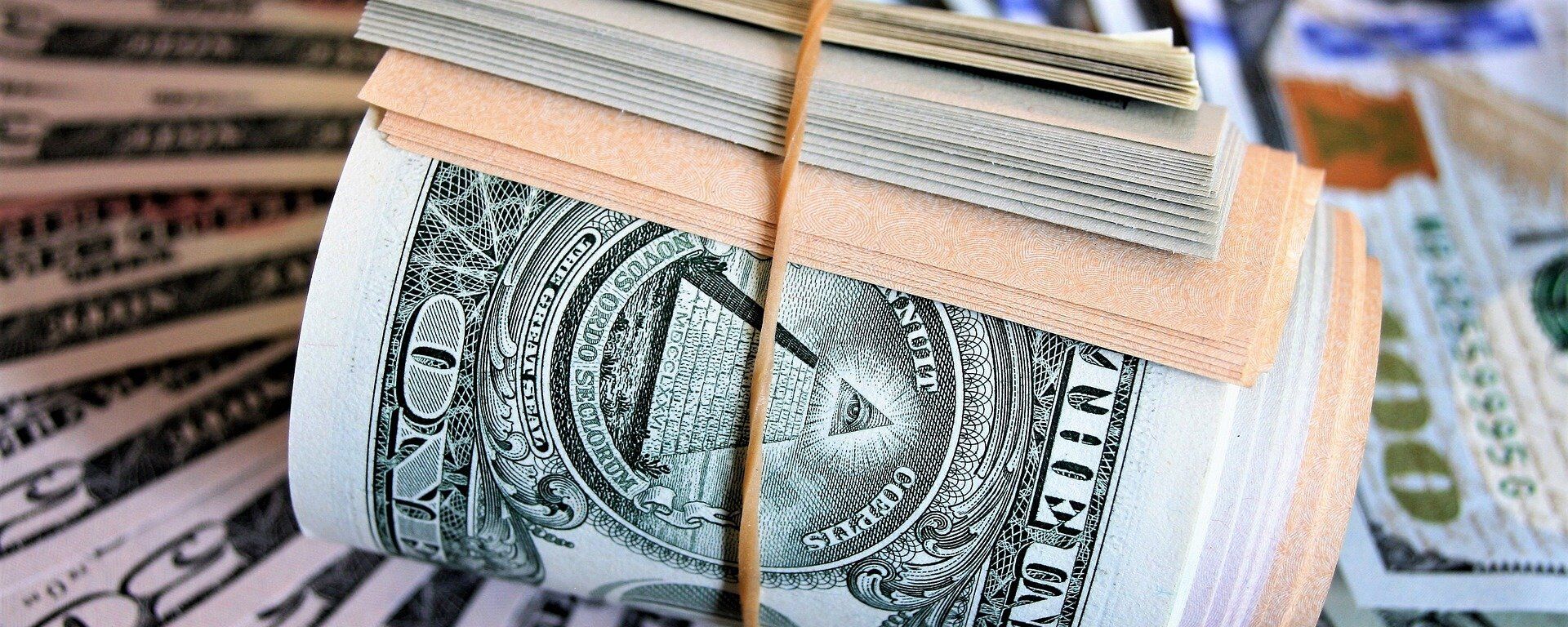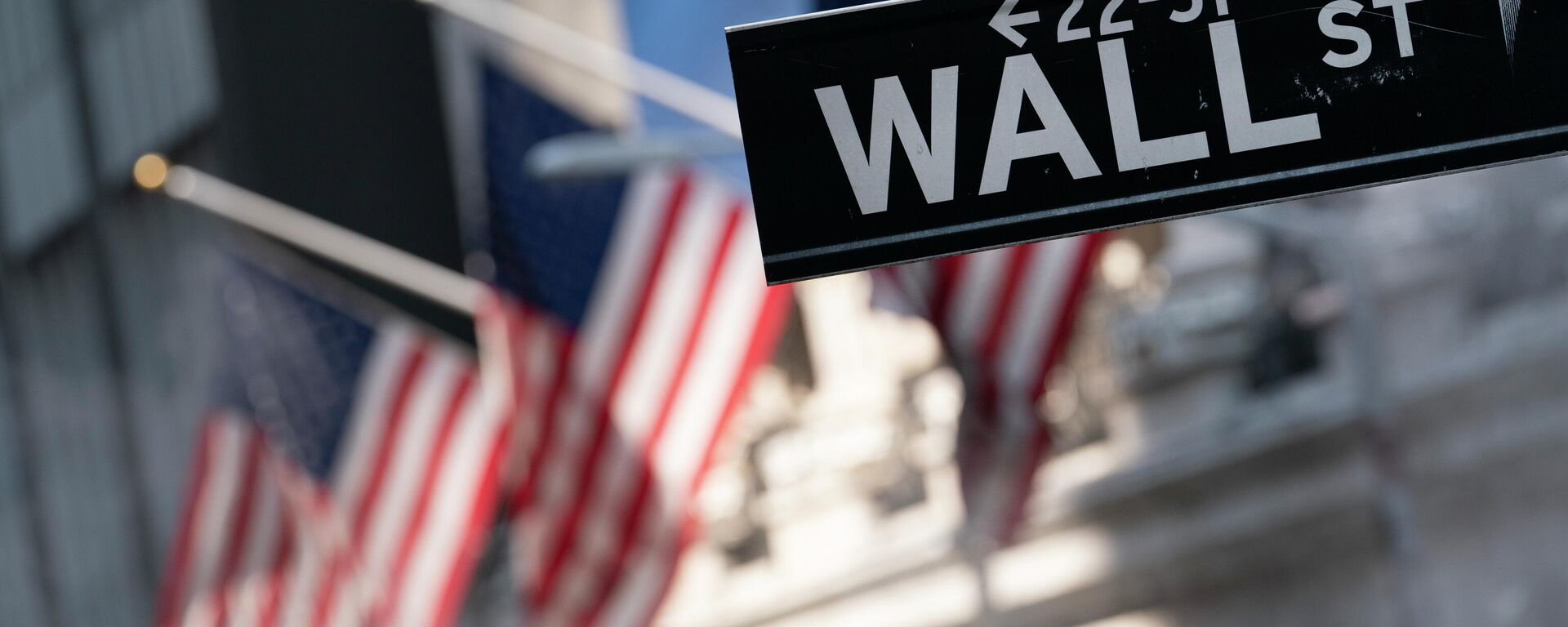https://sputnikglobe.com/20230327/looming-signs-of-credit-crunch-monitored-in-us--europe-very-closely-in-wake-of-bank-failures-1108814106.html
‘Sound & Resilient?’ Looming Signs of Credit Crunch Monitored in US & EU Following Bank Failures
‘Sound & Resilient?’ Looming Signs of Credit Crunch Monitored in US & EU Following Bank Failures
Sputnik International
Banking policymakers in US and Europe are closely monitoring banking stress for looming signs of a credit crunch.
2023-03-27T05:59+0000
2023-03-27T05:59+0000
2023-03-27T09:17+0000
economy
us
banks
european central bank
silicon valley bank collapse
credit suisse group ag
credit
us federal reserve
jerome powell
https://cdn1.img.sputnikglobe.com/img/07e7/03/11/1108491472_0:160:3073:1888_1920x0_80_0_0_fb655b28652f66168b32bc0ab879a00e.jpg
Banking officials both in the United States and in Europe are currently on the lookout for any signs that might indicate a looming credit crunch after the recent turmoil in the sector, according to US media reports.In the wake of the swift failures of America’s Silicon Valley Bank (SVB) and Signature Bank (SBNY.O), and the bailout merger of troubled Credit Suisse with UBS, a plethora of signs indicated that financial markets were under residual stress. The dollar strengthened against the euro and the pound sterling amid risk aversion, analysts said, while euro zone government bond yields plummeted.Accordingly, the banking sector is currently being scrutinized for stress buildup that might potentially burst into a credit crunch, Federal Reserve Bank of Minneapolis President Neel Kashkari told a US broadcaster. The need to flag warning signs of a credit crunch is rooted in the fact that it often comes hand in hand with a recession.A credit crunch, or credit squeeze, is generally the result of financial institutions granting loans to borrowers with a low credit rating. The fallout is a sudden reduction in the overall availability of loans, or a tightening of the conditions required to obtain a loan from banks.At the moment, it was too early to measure the extent of the "imprint" that any bank stress might have on the economy, or if it might influence the Federal Reserve's next interest rate option, added Kashkari. The Federal Reserve had opted for an interest rate increase of 25 basis points earlier in March. The increase brings the effective federal funds rate (EFFR) to 5%. The Fed also rolled out an emergency lending program available to eligible depository institutions. Federal Reserve Chairman Jerome Powell later told reporters that, "financial conditions seem to have tightened," and added:Powell insisted, however, that the banking system was “sound and resilient.”Meanwhile, amid the continuing financial market jitters, the European Central Bank (ECB) similarly reported a possible tightening in lending. ECB Vice President Luis de Guindos was cited as saying that there could be "an additional tightening of credit standards in the euro area.""And perhaps this will feed through to the economy in terms of lower growth and lower inflation," he stated.International Monetary Fund (IMF) Managing Director Kristalina Georgieva on Sunday also warned that vigilance was needed from policymakers. Speaking at the China Development Forum, the IMF chief indicated that 2023 would be a challenging year, with global growth "slowing to below 3 percent" and the "outlook for the global economy over the medium-term likely to remain weak."Furthermore, despite assurances trotted out by regulators, worried US customers collectively withdrew close to $100 billion from bank accounts in the wake of the recent bank collapses, according to Federal Reserve data. A larger part of the $98.4 billion pulled from accounts for the week ending on March 15 came from small banks, figures show. Weiging in on the imminent future of bank lending practices, Neel Kashkari was cited as adding:
https://sputnikglobe.com/20230326/jittery-us-customers-pulled-almost-100bln-in-deposits-amid-banking-crisis-fed-data-shows-1108793779.html
https://sputnikglobe.com/20230322/every-us-bank-is-at-risk-and-yellens-deceiving-depositors-by-saying-they-are-safe-economist-1108687018.html
Sputnik International
feedback@sputniknews.com
+74956456601
MIA „Rossiya Segodnya“
2023
News
en_EN
Sputnik International
feedback@sputniknews.com
+74956456601
MIA „Rossiya Segodnya“
Sputnik International
feedback@sputniknews.com
+74956456601
MIA „Rossiya Segodnya“
banking policymakers, us and europe, monitoring very closely, banking stress, looming signs, credit crunch, bank collapses, silicon valley collapse, signature bank, embattled credit suisse,
banking policymakers, us and europe, monitoring very closely, banking stress, looming signs, credit crunch, bank collapses, silicon valley collapse, signature bank, embattled credit suisse,
‘Sound & Resilient?’ Looming Signs of Credit Crunch Monitored in US & EU Following Bank Failures
05:59 GMT 27.03.2023 (Updated: 09:17 GMT 27.03.2023) Following the high-profile failures of America's Silicon Valley Bank and Signature Bank, along with the merger of Switzerland's embattled Credit Suisse with rival UBS, the Federal Reserve on March 22 opted for an interest rate hike of 25 basis points, while regulators sought to offer assurances that the banking system was "sound and resilient."
Banking officials both in the United States and in Europe are currently on the lookout for any signs that might indicate a looming credit crunch after the recent
turmoil in the sector, according to US media reports.
In the wake of the
swift failures of America’s Silicon Valley Bank (SVB) and Signature Bank (SBNY.O), and the
bailout merger of troubled Credit Suisse with UBS, a plethora of signs indicated that financial markets were under residual stress. The dollar strengthened against the euro and the pound sterling amid risk aversion, analysts said, while euro zone government bond yields plummeted.
Accordingly, the
banking sector is currently being scrutinized for stress buildup that might potentially burst into a credit crunch, Federal Reserve Bank of Minneapolis President Neel Kashkari told a US broadcaster. The need to flag warning signs of a credit crunch is rooted in the fact that it often comes hand in hand with
a recession.
A credit crunch, or credit squeeze, is generally the result of financial institutions granting loans to borrowers with a low credit rating. The fallout is a sudden reduction in the overall availability of loans, or a tightening of the conditions required to obtain a loan from banks.
"What's unclear for us is how much of these banking stresses are leading to a widespread credit crunch. That credit crunch ... would then slow down the economy. This is something we are monitoring very, very closely," Neel Kashkari said, adding that "It definitely brings us closer."
At the moment, it was too early to measure the extent of the "imprint" that any bank stress might have on the economy, or if it might influence the Federal Reserve's next interest rate option, added Kashkari.
The
Federal Reserve had opted for an interest rate increase of 25 basis points earlier in March
. The increase brings the effective federal funds rate (EFFR) to 5%. The Fed also rolled out an emergency lending program available to eligible depository institutions. Federal Reserve Chairman Jerome Powell later told reporters that, "financial conditions seem to have tightened," and added:
“We’ll be looking to see how serious is this and does it look like it’s going to be sustained. And if it is, it could easily have a significant macroeconomic effect, and we would factor that into our policy decisions," Fed Chairman Powell said.
Powell insisted, however, that the banking system was “sound and resilient.”
Meanwhile, amid the continuing financial market jitters, the European Central Bank (ECB) similarly reported a possible tightening in lending. ECB Vice President Luis de Guindos was cited as saying that there could be "an additional tightening of credit standards in the euro area."
"And perhaps this will feed through to the economy in terms of lower growth and lower inflation," he stated.
International Monetary Fund (IMF) Managing Director Kristalina Georgieva on Sunday also warned that vigilance was needed from policymakers. Speaking at the China Development Forum, the IMF chief indicated that 2023 would be a challenging year, with global growth "slowing to below 3 percent" and the "outlook for the global economy over the medium-term likely to remain weak."
Furthermore, despite assurances trotted out by regulators, worried US customers collectively withdrew close to $100 billion from bank accounts in the wake of the
recent bank collapses, according to Federal Reserve
data. A larger part of the $98.4 billion pulled from accounts for the week ending on March 15 came from small banks, figures show.
Weiging in on the imminent future of bank lending practices, Neel Kashkari was cited as adding:
"There are some concerning signs. On the positive side is deposit outflows seem to have slowed down. Some confidence is being restored among smaller and regional banks...We've seen that capital markets have largely been closed for the past two weeks. If those capital markets remain closed because borrowers and lenders remain nervous, then that would tell me, okay, this is probably going to have a bigger impact on the economy."




